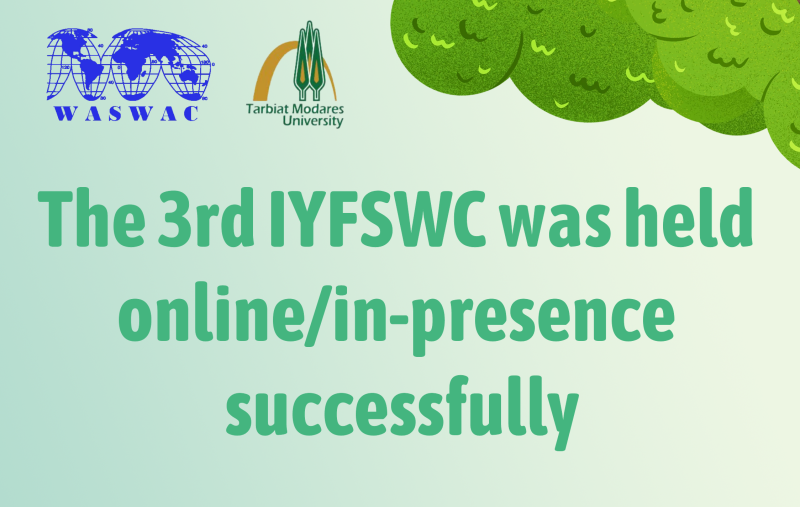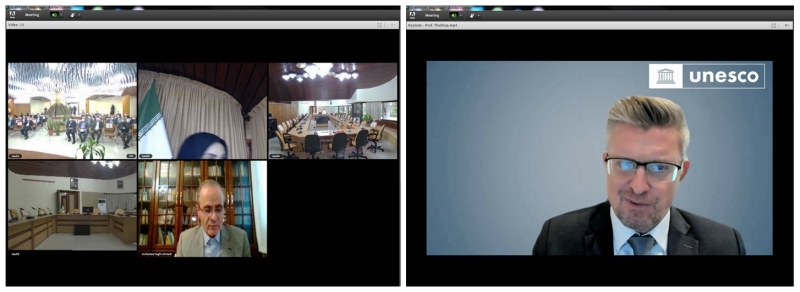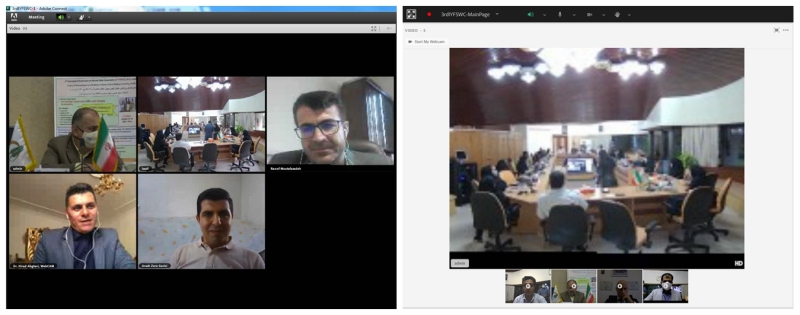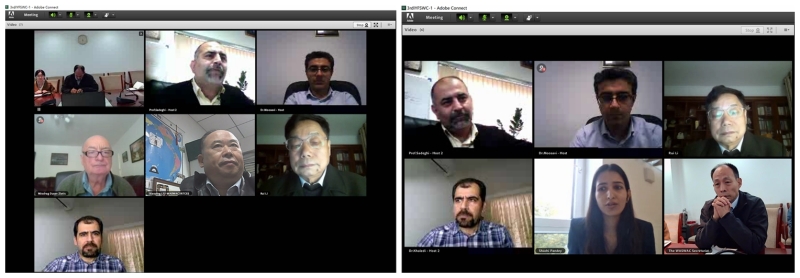
To
motivate the young generation to think and work on soil and water conservation,
WASWAC continues to hold the International Youth Forum on Soil and Water
Conservation (IYFSWC). Affected by the COVID-19 epidemic, international travels
became difficult, so the 3rd session was held in hybrid form of virtual
and in-presence under the strong support of the Faculty of Natural Resources
and Marine Sciences of Tarbiat Modares University, Noor City, Mazandaran
Province, Iran, where is the main conference place located. In addition, the
forum received valuable supports from different international and national organizations.
The UNESCO branch in Tehran and the Iranian National Commission for UNESCO, Agrohydrology Research Group (TMU), and
Kalleh Dairy Company financially supported the forum. Beijing Datum Technology
Development CO., LTD provided honorioums for the awardees of WASWAC Youth
Outstanding Paper Award (YOPA) 2021. In addition, valuable contributions from various
countries including Iran, China, India, Serbia, Russia, Turkey, Italy,
Montenegro, and Germany, have been well received and appreciated.
The
opening ceremony was held in online and in-presence combined form on October 17.
Dr. Masoud Mansour - the Deputy Minister of Jihad-e-Agriculture and Head of
Forests, Range & Watershed Management Organization, Prof. Mohammad Taghi
Ahmadi - the President of Tarbiat Modares Ubniversity, Prof. Abdolmohammad
Abedian Kenari – the Dean of the Faculty of Natural Resources and Marine
Sciences (TMU), Prof. Ning Duihu – the President of WASWAC, Dr. Liu Hongguang –
the representative of Jiangxi Academy of Water Science and Engineering, Prof.
Hans Thultrup – the UNESCO Representative, Prof. Seyed
Hamidreza Sadeghi – the forum secretary, and Prof. Ali Salajegheh – Head of
Department of Environment of Iran were given welcome addresses, speeches or
technical reports, respectively.

The screen capture during opening ceremony
A
total number of 106 abstract/full papers were collected, of which 51 full
papers were evaluated for the WASWAC Youth Outstanding Paper Award (DATUM) 2021
by senior international scientists globally. Total 140 participants including 50
in-presence and 90 online were persistently attended this forum.

The screen capture during the forum
The
following are the forum's main outcomes approved by all attendees (i.e., governmental
and non-governmental bodies, senior and junior scientists, experts,
researchers, academic intellectuals, extensionists, and post-graduate students)
who virtually and physically attended the forum.
(1)
The problem-oriented and monitoring-based integrated watershed management with
the active participation of all stockholders guarantees to maintain the
security and health of the watershed through which inter- and
intra-generational justice will also be achieved. In this regard, young people
who focusing on the conditions of watershed will play an essential role in
innovating and creating new ideas based on social, cultural, and geographical
conditions.
(2)
Adaptive and integrated watershed management was discussed and analyzed as a
sound approach to be applied for soil and water resources conservation in
changing environments with a high level of uncertainties.
(3)
The Watershed governance approach as a holistic view and based on the river
basin organization (RBO) concept was advisable to govern the entire available
resources at the watershed level.
(4)
Sustainable development approaches like low impact development, in-situ indigenous
and decentralized rainwater harvesting system, resources multiple-use, rain
cities, and lifestyle review were recognized as achievable approaches for
proper management of soil and water resources in changing conditions.
(5)
Using innovations, new/high technologies, indirect measurements, economically
affordable, technically sound, comparative studies, and environmentally
friendly was pointed out for the effective and fast soil and water
conservation.
(6)
Implementation of lawful, low-cost, and environmentally friendly approaches
such as forest and rangeland reclamation, ecosystem restoration, and micro-organism
inoculation were recommended for sustainable soil and water conservation.
(7)
Collaborative consideration of different components of the soil erosion and
water cycle processes at different global, regional, national, and finally
watershed levels was amplified for better and meaningful modeling of soil and
water-related issues.
(8)
In cooperation with scientists working in soil erosion and sediment yield
assessments, geospatial and temporal modeling were emphasized as a robust
approach to get appropriate managerial strategies for soil and water
conservation.
(9)
Quantitative and qualitative (e.g., WOCAT) monitoring-based assessments with a
further focus in developing countries were also emphasized as a valuable
baseline for drawing a proper roadmap in soil and water conservation in
changing environments.
(10)
Thorough consideration in land-use/cover management in different ecosystems
with particular attention to various payment for ecosystem services (PES)
approach for quality and quantity conservation soil and water resources was
also approved.
(11)
The close and synergic collaboration among national (e.g., Universities,
Iranian Watershed Management Society; Water Harvesting Society; Forest, Rangeland
and Watershed Management Organization and Soil Conservation and Watershed Management
Institute of Iran) and international (e.g., Universities, WASWAC, UNESCO, UNDP,
FAO, Soil and Water Conservation Society of India) executive, educational,
research and policymaking agencies as well as WASWAC networking (e.g., establishing
WASWAC Youth Network) was affirmed to get significant achievement in motivating
young and woman in soil and water conservation planning at different scales.
(12)
Integrated planning should be based on a rational approach based on the
soil-water-food-energy nexus and footprint at the watershed scale.
(13)
Especially, the diligent participation of youth and women in the ‘‘International
Center for Integrated Watershed Management and Biological Resources in Arid and
Semi-arid Areas in Iran’’ is necessary to achieve the goals of integrated
watershed management. The invitation of Prof. Seyed Hamidreza Sadeghi for the
membership in the Board of Governors of this center as a representative of
Tarbiat Modares University, cooperation, and compelling presence of the WASWAC
was also approved.
After
this forum, a virtual summary meeting was held on October 20, high evaluation
and appreciation were given to the forum secretary Prof. Seyed
Hamidreza Sadeghi and his team by Prof. Ning Duihu,
the president of WASWAC, Prof. Li Rui, the honorary president of WASWAC, Prof.
Liu Xiaoying, the Secretary-general of WASWAC, and Prof. Miodrag Zlatic, the
Councilor and the Past President of WASWAC.

The screen capture for the forum summary meeting

